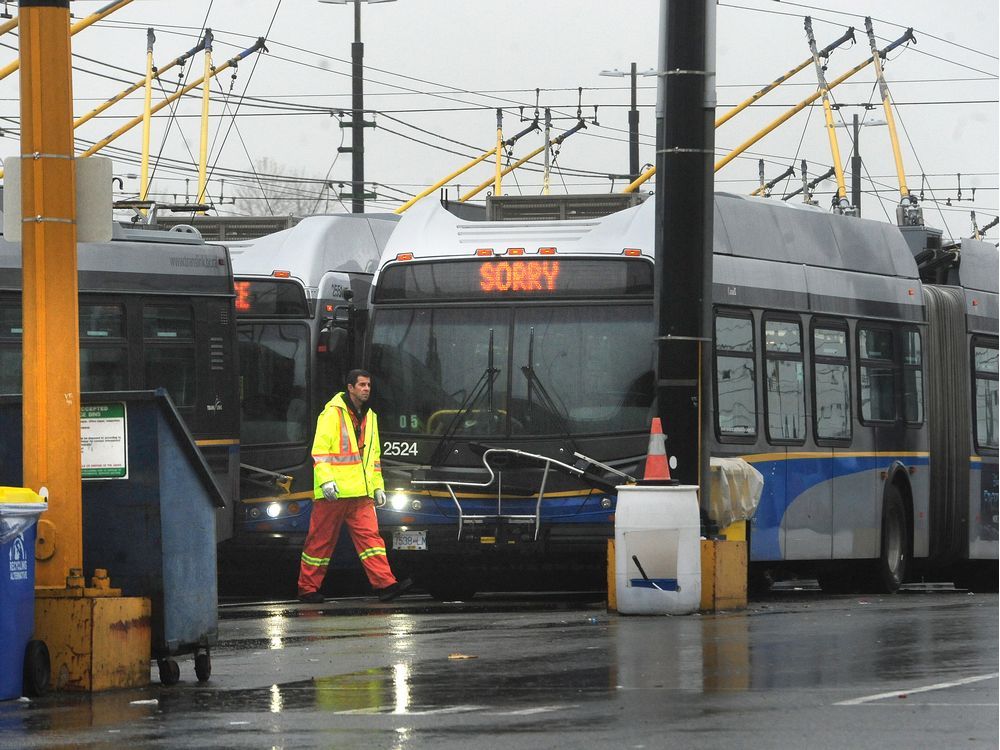Transit strike: Bargaining resumes as drivers threaten overtime ban

Credit to Author: Jennifer Saltman| Date: Wed, 13 Nov 2019 22:26:35 +0000
Job action by 5,000 Metro Vancouver transit workers will escalate Friday, with bus drivers refusing to work overtime, if a collective agreement isn’t reached in the next two days.
Talks have resumed this morning, with sessions scheduled for Wednesday and Thursday.
On Tuesday, after almost two weeks of stalled talks and limited strike action, Unifor, the union that represents bus and SeaBus operators and maintenance workers, reached out to the Coast Mountain Bus Company, an operating firm of regional transit authority TransLink, to resume bargaining.
“We will see whether or not the company is serious about achieving a resolution to this dispute, and if they are, bargaining can be wrapped up in a matter of hours,” said Gavin McGarrigle, Unifor’s western regional director, who said the union remains “deeply skeptical” of the company’s motives.
Before talks resumed on Wednesday morning, CMBC president Michael McDaniel issued a statement, saying the company is optimistic it can find common ground with the union and work toward an agreement which satisfies both parties.
“While our current offer is in excess of public sector settlements in British Columbia today, we are open to improving our overall proposal at the bargaining table. This includes building on the proposal we’ve already put forward to improve working conditions,” he said in the statement.
McGarrigle said Wednesday the union heard on the weekend that the company is willing to talk about some of the issues like guaranteed minimum break times. However, he remains skeptical.
“If we find that we spend a couple of days here in negotiations with an escalation on the horizon, and we find out there is a lot of game playing again, that will send a pretty strong message to our committee and our members and I think they will probably dig in a lot firmer than before,” McGarrigle told reporters before talks Wednesday.
If a deal isn’t reached, strike action will escalate Friday with a one-day OT ban for bus drivers. Drivers have already been instructed to refuse overtime shifts for that day.
“We will also consider additional days next week and in the weeks to come,” McGarrigle said. “Ultimately, disruption will continue to escalate until a full strike will occur. We know that the impact of this escalation will significantly impact service for the passengers this Friday, and in various other ways to come.”
The union has estimated that 10-15 per cent of bus service would be taken offline if drivers were to refuse OT.
Both the union and TransLink have said it’s difficult to predict what bus routes could be affected by a driver overtime ban.
Thus far, job action has consisted of a uniform ban for bus drivers and an overtime ban for maintenance workers.
As of Tuesday afternoon, there had been 126 SeaBus sailing cancellations since the strike began Nov. 1, and last Friday frequency was reduced on 25 bus routes during the morning rush because of the OT ban by maintenance workers.
TransLink spokeswoman Jill Drews said the transit authority uses “a relatively small amount of overtime,” with 4.8 per cent of all bus-maintenance hours paid as OT last year, and 10 per cent of SeaBus staff hours.
According to TransLink, bus service has since returned to almost normal — maintenance workers were able to catch up over the weekend — with only four trip cancellations related to job action Tuesday morning. Drews said the number of buses the company has in reserve to replace out-of-service buses varies day-to-day.
Wages and working conditions for bus drivers are the major issues.
The deal being offered to transit workers includes a 12.2-per-cent pay increase for skilled trades over four years, and a 9.6-per-cent pay increase for transit operators over the same period. The company has also offered to implement measures to improve working conditions.
Under the current contract, conventional bus drivers start at $22.83 an hour during a 30-day training period, then go from $24.46 an hour to $32.61 an hour after 24 months of employment. Those driving 40- and 60-foot buses get benefits that include medical, vision and dental, a pension plan and family bus passes.
Unifor is seeking an increase of 15.2 per cent over four years for bus drivers and 16.7 per cent over four years for maintenance workers. It’s also asking for improved benefits and better working conditions, including a guaranteed minimum break time for drivers while they’re on shift.
McGarrigle said the company’s last offer was “ridiculous” and said it had loopholes “big enough to drive a SeaBus through.”
Coast Mountain has said the union’s request would work out to an added $680 million in costs over 10 years, while the company’s offer would mean an increase of $71 million over 10 years.
Last week Coast Mountain asked the union to return to bargaining, but the union refused because it said the company had failed to address a wage gap for skilled-trades workers and minimum breaks for bus drivers.
B.C. Premier John Horgan, who warned last week that lengthy job action, similar to a four-month transit strike in 2001, will not be tolerated, said he was grateful to hear the two parties were planning to resume bargaining.
“I believe in free collective bargaining — it’s the way forward,” Horgan said Tuesday afternoon, after an unrelated announcement in Richmond. “I’m hopeful that both sides will be able to find an agreement so the travelling public will carry on and go about their business. That’s the objective that we all want, whether we’re on the workers’ side of the table or on the employer’s side.”
— With files from Gordon McIntyre, Tiffany Crawford, and Adam Foster